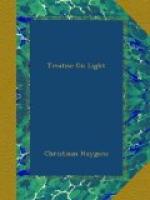Now if one examines what this matter may be in which the movement coming from the luminous body is propagated, which I call Ethereal matter, one will see that it is not the same that serves for the propagation of Sound. For one finds that the latter is really that which we feel and which we breathe, and which being removed from any place still leaves there the other kind of matter that serves to convey Light. This may be proved by shutting up a sounding body in a glass vessel from which the air is withdrawn by the machine which Mr. Boyle has given us, and with which he has performed so many beautiful experiments. But in doing this of which I speak, care must be taken to place the sounding body on cotton or on feathers, in such a way that it cannot communicate its tremors either to the glass vessel which encloses it, or to the machine; a precaution which has hitherto been neglected. For then after having exhausted all the air one hears no Sound from the metal, though it is struck.
One sees here not only that our air, which does not penetrate through glass, is the matter by which Sound spreads; but also that it is not the same air but another kind of matter in which Light spreads; since if the air is removed from the vessel the Light does not cease to traverse it as before.
And this last point is demonstrated even more clearly by the celebrated experiment of Torricelli, in which the tube of glass from which the quicksilver has withdrawn itself, remaining void of air, transmits Light just the same as when air is in it. For this proves that a matter different from air exists in this tube, and that this matter must have penetrated the glass or the quicksilver, either one or the other, though they are both impenetrable to the air. And when, in the same experiment, one makes the vacuum after putting a little water above the quicksilver, one concludes equally that the said matter passes through glass or water, or through both.
As regards the different modes in which I have said the movements of Sound and of Light are communicated, one may sufficiently comprehend how this occurs in the case of Sound if one considers that the air is of such a nature that it can be compressed and reduced to a much smaller space than that which it ordinarily occupies. And in proportion as it is compressed the more does it exert an effort to regain its volume; for this property along with its penetrability, which remains notwithstanding its compression, seems to prove that it is made up of small bodies which float about and which are agitated very rapidly in the ethereal matter composed of much smaller parts. So that the cause of the spreading of Sound is the effort which these little bodies make in collisions with one another, to regain freedom when they are a little more squeezed together in the circuit of these waves than elsewhere.
But the extreme velocity of Light, and other properties which it has, cannot admit of such a propagation of motion, and I am about to show here the way in which I conceive it must occur. For this, it is needful to explain the property which hard bodies must possess to transmit movement from one to another.




